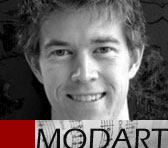7 August 2009
The MODART diaries, part VIII
 Image: Lachlan Skipworth
Image: Lachlan Skipworth During the process of almost any creative project, we need to stop and observe our progress from afar. But how do we, as composers, take this step back from our work? We are not dealing with physical space, like a painter, but with time, which flows steadily throughout a performance. Unable to alter this flow of time, we must distill our work into a single static moment, during which we can attempt to gain a concept of the overall dimensions. Immediately, this becomes a foray into the abstract, and a unique skill needs to be developed in order to gain this sense of 'whole'. Fortunately, the MODART experience has allowed me to find my own approach to this.
In an attempt to understand our universe as a whole, cosmologists explore the smallest particles of matter, their make-up, and how they behave. From this, they are able to make extrapolatory predictions about the nature of the universe. Similarly, as Roland and The Song Company's guidance challenged me to focus on the finest technical details of my work-in-progress, I reached a new level of structural awareness. By having a clearer concept of the musical elements with which I was working, such as small ornamental nuances, the balance of a chord or the choice of vocal register, I was able to gain that much-needed perspective of the whole. Given my background in shakuhachi music and choice of a piece of Japanese calligraphy as the text for my work, it's not surprising that I rationalised this new-found sense of global structure in terms of 'Ma', a Japanese concept of absolute space and time.
'Ma' is a major consideration in most Japanese art forms, and although unmeasured in a numerical sense, it exists always on every level. For me, composing with 'Ma' became like calligraphy, where a single brushstroke is more than just an isolated event. Rather, everything is done with a sense of how that stroke, alongside others, will become a character, how that character will combine with others to become a word, and how the words will be spaced on a page to create an aesthetically pleasing image. By taking utmost care with the small details of my work, I began this process of building my piece with every level of the whole in mind. As a result, my work shows a far greater sense of balance, or structural 'Ma'.
MODART, of course, is the single brushstroke, not the final image. The skills and musical ideas I've learned in this program I will continue to explore and expand as I strive to develop a musical language of my own. All nine works created this year are of exceptional standard, and will take on a life of their own as they are given subsequent performances and new interpretations. Finally, the friendships and professional networks made here will foster exciting new collaborations both in Australia and internationally. MODART has sown the seeds, and with continued support, is a project that will ensure us a flourishing contemporary music scene for the future.
Further links
MODART 2009 - a concert review by Rachel Orzech on Resonate
Australian Music Centre - MODART09 (www.australianmusiccentre.com.au/about/modart)
MODART and 25 years of The Song Company - a feature on Resonate
The Modart Diaries, part I - Lachlan Skipworth
The Modart Diaries, part II - Amy Bastow
The Modart Diaries, part III - Melody Eötvös
The Modart Diaries, part IV - Rae Howell
The Modart Diaries, part V - Mark Oliveiro
The Modart Diaries, part VI - Alexandra Hay
The Modart Diaries, part VII - Anthony Dunstan
The Song Company (www.songcompany.com.au)
© Australian Music Centre (2009) — Permission must be obtained from the AMC if you wish to reproduce this article either online or in print.
Lachlan Skipworth is a Sydney-based composer, originally from Perth. He studied composition with Roger Smalley and Anne Boyd, and spent two and a half years in Japan learning shakuhachi with Kakizakai Kaoru and revered master Yokoyama Katsuya. Skipworth was a featured composer at the 2008 World Shakuhachi Festival in Sydney. His music has been presented by Sydney's 'Chronology Arts' organisation, with whom he has also appeared as a guest conductor. In late 2009, Skipworth will spend three months in Tokyo as part of the Asialink Arts Residency Program.
Comments
Be the first to share add your thoughts and opinions in response to this article.
You must login to post a comment.